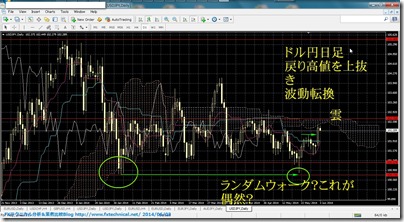FOMC声明 日本時間 2014/6/19 (木) 03:00ごろ発表
※前回のFOMC声明はこちら
Press Release
Release Date: June 18, 2014
For immediate release
Information received since the Federal Open Market Committee met in April indicates that growth in economic activity has rebounded in recent months. Labor market indicators generally showed further improvement. The unemployment rate, though lower, remains elevated. Household spending appears to be rising moderately and business fixed investment resumed its advance, while the recovery in the housing sector remained slow. Fiscal policy is restraining economic growth, although the extent of restraint is diminishing. Inflation has been running below the Committee's longer-run objective, but longer-term inflation expectations have remained stable.
Consistent with its statutory mandate, the Committee seeks to foster maximum employment and price stability. The Committee expects that, with appropriate policy accommodation, economic activity will expand at a moderate pace and labor market conditions will continue to improve gradually, moving toward those the Committee judges consistent with its dual mandate. The Committee sees the risks to the outlook for the economy and the labor market as nearly balanced. The Committee recognizes that inflation persistently below its 2 percent objective could pose risks to economic performance, and it is monitoring inflation developments carefully for evidence that inflation will move back toward its objective over the medium term.
The Committee currently judges that there is sufficient underlying strength in the broader economy to support ongoing improvement in labor market conditions. In light of the cumulative progress toward maximum employment and the improvement in the outlook for labor market conditions since the inception of the current asset purchase program, the Committee decided to make a further measured reduction in the pace of its asset purchases. Beginning in July, the Committee will add to its holdings of agency mortgage-backed securities at a pace of $15 billion per month rather than $20 billion per month, and will add to its holdings of longer-term Treasury securities at a pace of $20 billion per month rather than $25 billion per month. (今回も100億ドルの縮小!) The Committee is maintaining its existing policy of reinvesting principal payments from its holdings of agency debt and agency mortgage-backed securities in agency mortgage-backed securities and of rolling over maturing Treasury securities at auction. The Committee's sizable and still-increasing holdings of longer-term securities should maintain downward pressure on longer-term interest rates, support mortgage markets, and help to make broader financial conditions more accommodative, which in turn should promote a stronger economic recovery and help to ensure that inflation, over time, is at the rate most consistent with the Committee's dual mandate.
The Committee will closely monitor incoming information on economic and financial developments in coming months and will continue its purchases of Treasury and agency mortgage-backed securities, and employ its other policy tools as appropriate, until the outlook for the labor market has improved substantially in a context of price stability. If incoming information broadly supports the Committee's expectation of ongoing improvement in labor market conditions and inflation moving back toward its longer-run objective, the Committee will likely reduce the pace of asset purchases in further measured steps at future meetings. However, asset purchases are not on a preset course, and the Committee's decisions about their pace will remain contingent on the Committee's outlook for the labor market and inflation as well as its assessment of the likely efficacy and costs of such purchases.
To support continued progress toward maximum employment and price stability, the Committee today reaffirmed its view that a highly accommodative stance of monetary policy remains appropriate. In determining how long to maintain the current 0 to 1/4 percent target range for the federal funds rate, the Committee will assess progress--both realized and expected--toward its objectives of maximum employment and 2 percent inflation. This assessment will take into account a wide range of information, including measures of labor market conditions, indicators of inflation pressures and inflation expectations, and readings on financial developments. The Committee continues to anticipate, based on its assessment of these factors, that it likely will be appropriate to maintain the current target range for the federal funds rate for a considerable time after the asset purchase program ends, especially if projected inflation continues to run below the Committee's 2 percent longer-run goal, and provided that longer-term inflation expectations remain well anchored.
When the Committee decides to begin to remove policy accommodation, it will take a balanced approach consistent with its longer-run goals of maximum employment and inflation of 2 percent. The Committee currently anticipates that, even after employment and inflation are near mandate-consistent levels, economic conditions may, for some time, warrant keeping the target federal funds rate below levels the Committee views as normal in the longer run.
Voting for the FOMC monetary policy action were: Janet L. Yellen, Chair; William C. Dudley, Vice Chairman; Lael Brainard; Stanley Fischer; Richard W. Fisher; Narayana Kocherlakota; Loretta J. Mester; Charles I. Plosser; Jerome H. Powell; and Daniel K. Tarullo.
http://www.federalreserve.gov/newsevents/press/monetary/20140618a.htm
日本時間3:30ごろから イエレン議長会見
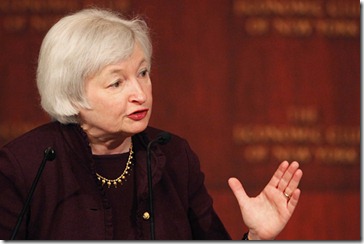
「今年のGDP下方修正は第1四半期の結果を受けたもの。」
「FRBの債券保有で市場金利への下押し圧力維持。」
「QE縮小は慎重なペースで継続の公算。緩和縮小継続は目標への進ちょく継続するとの見方反映。」
「経済下振れなら緩和策をより長期間維持する可能性。FOMCは利上げの手段を所持。主要金利の動向は経済指標次第。」
「最近のCPIは高めに推移。インフレ率は2%に回帰と予想。最近の兆候が示唆。」
「失業率予想の中心は前回より下がった。ただ、高止まりしている。」
「失業率低下の一部は労働市場の劣化後退を反映している訳ではない。」
「金利の行方ついて不確実であることは、市場は認識すべき。」
「労働参加率は下がっており、一部は循環要因の可能性。」
「金利見通しの予測分布図は意見の相違の幅を示す。」
「住宅市場の回復鈍化は信用度低い借り手による融資獲得の困難さが一因。」
前回のFOMCとの変更点は、QE3実施規模をさらに縮小。
昨年12月まで、毎月850億ドルの流動性供給(ドルをジャブジャブに刷りまくり)
→昨年12月のFOMCで750億ドルへ縮小、
→さらに1月のFOMCで650億ドルへ縮小
→さらに3月のFOMCで550億ドルへ縮小。
→さらに5月のFOMCで450億ドルへ縮小。
→さらに今回、350億ドルへ縮小。
毎回100億ドル、約1兆円ずつの流動性供給低下です。
昨年12月までと比較すると、毎月ベースで流動性供給は半分以下まで低下です。
額にすると、毎月5兆円の流動性供給を減らしたことになります。
ドルをジャブジャブにする(=希薄化)ペースを緩める、ということで、
ファンダメンタル分析的にはドル高材料のはずです。
逆に、株式市場的には株安材料です。
金利については、金利自体は変更無し。
ゼロ金利解除の条件についても、前回とほぼ同じ内容です。
その後のイエレン会見では、
低金利堅持アピール、
インフレ率については明るい兆しの話が出ました。
前者はドル安材料、
後者はドル高材料で、
これまたどちらか一方通行の内容ではありません。
ファンダメンタル分析的に考えれば、
・QE3縮小→ドル高、株安
・低金利堅持アピール→ドル安、株高
であり、
単純にどちらか一方通行になるような、単純な材料ではありません。
それでも、上か下かどちらかなのか、
ファンダメンタル分析的に考えると、
今回は、QE3の100億ドル縮小が実行されたわけですから、
ドル高、株安になる可能性が高いように思えます。
(あくまでもファンダメンタル分析)
これを受けてマーケットはどのように反応したのでしょうか。
↓のチャートを見る前に1分間想像してみてください。
・NYダウ の値動き → 上昇?下落?
・ドル円 の値動き → 上昇?下落?
・ユーロドル の値動き → 上昇?下落?
・ユーロ円 の値動き → 上昇?下落?
・ポンドドル の値動き → 上昇?下落?
・ポンド円 の値動き → 上昇?下落?
・原油 の値動き → 上昇?下落?
・金 の値動き → 上昇?下落?



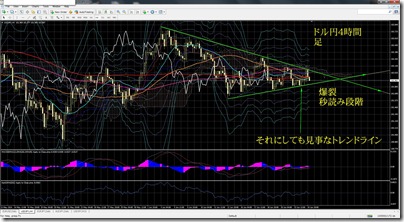
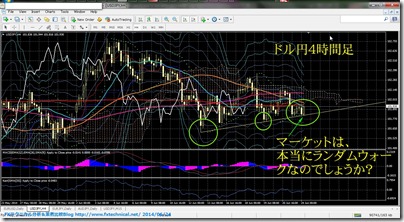
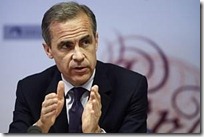

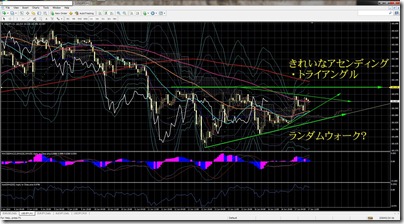
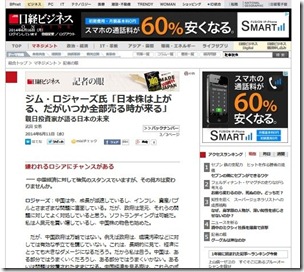
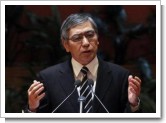

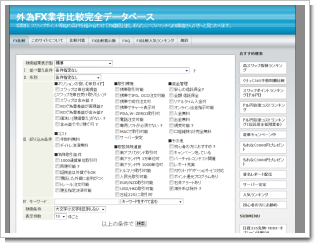
 スワップポイントのデータを最新に更新しました。
スワップポイントのデータを最新に更新しました。

